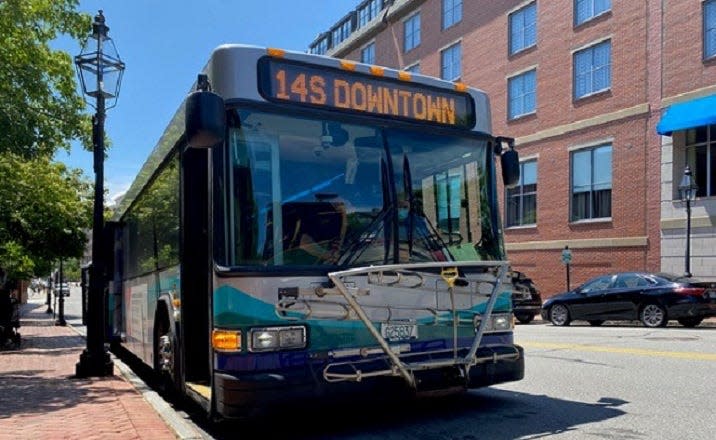NH lags in funding public transit. How Dover, Seacoast towns are looking to change that.
DOVER — Deputy Mayor Dennis Shanahan has been working on the city's master plan, which focuses on what Dover should look like in 10-12 years. One requested improvement comes up consistently.
“We've reached out to a number of different individuals and groups,” he said. “One item that keeps coming up is the importance of public transit. And these are unsolicited comments.”
The Dover City Council recently voted 8-1 to join the Statewide Transportation Coalition. Portsmouth is also on board, according to Shanahan, and other communities are considering it, too.

The coalition is a collaboration between the Cooperative Alliance for Seacoast Transportation (COAST Bus) and the New Hampshire Transit Association with the goal of expanding access to transportation services across the state by seeking increased state funding.
Transportation funding is an area where New Hampshire is lagging behind other states, according to local transportation stakeholders and advocates.
“Public transit connects people to the places they need to be and (plays) a vital role in our communities, whether that be for economic development, students accessing educational opportunities, folks getting to commerce and getting access to services,” Shanahan said. “We'd like to continue to be able to play that role and even expand.
“The vision of Dover in the future has a strong and growing public transit system. Not only for those that need it, but those that want it.”
How New Hampshire’s transportation funding looks currently
“Our primary objective, as the coalition, is to seek increased state funding as part of the state budget,” said Rad Nichols, the executive director of COAST Bus, which in 2022 received $7.7 million in federal funding to build a new facility in Dover.
New Hampshire's most recent budget for transportation was $200,000, the lowest in New England, according to a 2022 survey conducted by the American Association of State Highway and Transportation Officials. That $200,000 includes COAST's $34,000 portion.
“It funds about a day and a half of operations — three days if you match it against the federal funds that we have from the Federal Transit Administration,” Nichols said.
New Hampshire’s state transportation funding is one-20th of that spent by Maine, the second-lowest state at $4,061,833, and one-70th of Vermont, the third lowest, at $7,087,000, according to the AASHTO 2022 Survey of State Funding for Public Transportation.
“What we're facing is a situation where our emergency funding related to the pandemic is beginning to get close to fully expended,” Nichols said. He said the COVID-19 relief funds, provided by the Federal Transit Administration, are expected to be used up by 2024.
In addition, operating costs have begun escalating over the past three years due to inflation and workforce shortages for commercially licensed drivers, he said.
How would the coalition help with funding?
A 27% increase in public transportation funds from the federal government has recently become available to New Hampshire through the Infrastructure Investment and Jobs Act signed by President Joe Biden in 2021, Nichols said. Matching funds are required in order for the state to receive the federal money.
To make this happen, providers of public transportation are asking the state for $2.7 million for each year of New Hampshire's biennial budget.
The coalition is forming to advocate for these funds with the goal of expanding access to transportation in local communities.
Why public transportation is important
Shanahan expanded on why these services are vital to the community.
“One of the city council's goals is certainly to address housing and homelessness,” he said. “And a key part of that is public transit.”
He reiterated that the pandemic exacerbated shortages in transportation services.
“People who needed to use public transit to get to their doctor's appointments, to get groceries, were limited in that. And that really gave us a taste of what could happen if we can't work through and get the support from the state that we need,” Shanahan said.
“The folks that rely on public transit across the state have disproportionately lower income and are disproportionately disabled,” Shanahan told the council at a recent meeting. “It's a humane issue that needs to be addressed.”
He emphasized in order to make forward motion with the coalition, the state as a whole must be on board.
Progress in gaining support for public transportation funds in NH
There are nine transportation systems across the state that serve a total of 34 communities. These all currently receive some state funding and therefore will be involved with the coalition, said Nichols.
So far, Dover and Portsmouth have acted on resolutions to move forward with their participation in the coalition, according to Shanahan. Shanahan also met with Rochester and Somersworth councils, which he said were supportive. Newington's select board was also set to discuss it.
Shanahan said he has reached out and hopes to hear from a number of other Seacoast communities regarding the effort, as well.
He is also discussing the coalition with the New Hampshire Municipal Association, a board on which he serves.
Acknowledging local budgets are challenged
Shanahan said he is aware that municipal budgets are stretched thin and wants to avoid any overwhelming increase in money collected from local communities.
“We’ve heard a lot about costs being pushed back down to municipalities. And we're really trying to avoid that and trying to get the state to pay its fair share.”
Shanahan provided an example.
“The town of Kittery, (Maine), which has just a few miles of service in it, contributes more than the entire state of New Hampshire does to the operations of COAST (Bus),” he said.
Nichols said the coalition could be officially set in stone when the state budget is approved before the start of the new fiscal year on July 1.
This article originally appeared on Fosters Daily Democrat: Dover, Seacoast towns push NH to fund COAST Bus, public transit

